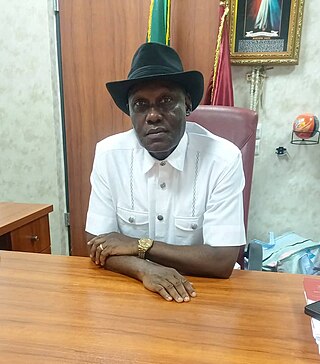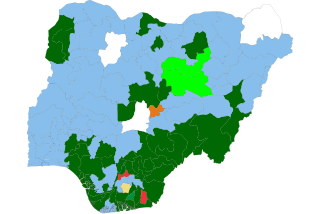President of the Senate is a title often given to the presiding officer of a senate. It corresponds to the speaker in some other assemblies.

The speaker of a deliberative assembly, especially a legislative body, is its presiding officer, or the chair. The title was first used in 1377 in England.

The Senate of the Dominican Republic is the upper house in the bicameral legislature of the Dominican Republic, and together with the Chamber of Deputies makes up the Congress.

The National Council of Provinces (NCOP) is the upper house of the Parliament of South Africa under the (post-apartheid) constitution which came into full effect in 1997. It replaced the former Senate, but is very similar to that body, and to many other upper houses of legislatures throughout the world, in that its purpose is to represent the governments of the provinces, rather than directly representing the people.

The Michigan Senate is the upper house of the Michigan Legislature. Along with the Michigan House of Representatives, it composes the state legislature, which has powers, roles and duties defined by Article IV of the Michigan Constitution, adopted in 1963. The primary purpose of the Legislature is to enact new laws and amend or repeal existing laws.

The National Assembly of Pakistan is the lower house of the bicameral Parliament of Pakistan, with the upper house being the Senate. As of 2023, the National Assembly has a maximum membership of 342, of which 266 are directly elected by an adult universal suffrage and a first-past-the-post system to represent their respective constituencies, while 70 are elected on reserved seats for women and religious minorities from all over the country and six on reserved seats for former Federally Administered Tribal Areas. Members hold their seats for five years or until the house is dissolved by the President on the advice of the Prime Minister. The house convenes at the Parliament House, Red Zone, Islamabad.

The Parliament of Pakistan is the supreme legislative body of the Islamic Republic of Pakistan. It is a bicameral federal legislature, composed of the President of Pakistan and two houses: the Senate and the National Assembly. The president, as head of the legislature, has the power to summon or prorogue either house of the Parliament. The president can dissolve the National Assembly, only on the Prime Minister's advice.

The Illinois Senate is the upper chamber of the Illinois General Assembly, the legislative branch of the government of the State of Illinois in the United States. The body was created by the first state constitution adopted in 1818. Under the Illinois Constitution of 1970, the Illinois Senate is made up of 59 senators elected from individual legislative districts determined by population and redistricted every 10 years; based on the 2020 U.S. census each senator represents approximately 213,347 people. Senators are divided into three groups, each group having a two-year term at a different part of the decade between censuses, with the rest of the decade being taken up by two four-year terms. This ensures that the Senate reflects changes made when the General Assembly redistricts itself after each census.

The Georgia state Senate is the upper house of the Georgia General Assembly, in the U.S. state of Georgia.

The Senate of Puerto Rico is the upper house of the Legislative Assembly of Puerto Rico, the territorial legislature of Puerto Rico. The Senate, together with the House of Representatives of Puerto Rico, control the legislative branch of the government of Puerto Rico.

The New York State Senate is the upper house of the New York State Legislature, while the New York State Assembly is its lower house. Established in 1777 by the Constitution of New York, its members are elected to two-year terms with no term limits. There are 63 seats in the Senate. The Democratic Party has held control of the New York State Senate since 2019. The Senate Majority Leader is Andrea Stewart-Cousins.

The House of Representatives is the lower chamber of Nigeria's bicameral National Assembly. The Senate is the upper chamber.

The Oklahoma Senate is the upper house of the two houses of the Legislature of Oklahoma, the other being the Oklahoma House of Representatives. The total number of senators is set at 48 by the Oklahoma Constitution.
Enyinnaya Harcourt Abaribe is a Nigerian politician who has served as the senator representing Abia South senatorial district since 2007. He previously served as deputy governor of Abia State from 1999 until his resignation and subsequent impeachment in March 2003. He was the minority leader in the 9th senate.

The United States Senate is the upper chamber of the United States Congress. The United States Senate and the lower chamber of Congress, the United States House of Representatives, comprise the federal bicameral legislature of the United States. Together, the Senate and the House maintain authority under Article One of the U.S. Constitution to pass or defeat federal legislation. The Senate has exclusive power to confirm U.S. presidential appointments, ratify treaties, exercise advice and consent powers, and try cases of impeachment brought by the House. The Senate and the House provide a check and balance on the powers of the executive and judicial branches of government.
Alhassan Ado Garba popularly known as Alhassan Doguwa is the Majority Leader of House of Representatives of Nigerian today. He is an All Progressive Congress (APC) member representing Doguwa/Tudun Wada Federal Constituency of Kano State.
The table below lists the Nigerian senators of the 8th National Assembly. The Senate included three senators from each of the 36 states, plus one senator for the Federal Capital Territory. The Senate president was Sen. Bukola Saraki of the All Progressives Congress and the deputy Senate president was Ike Ekweremadu. The Senate president and his deputy were assisted by the principal officers including the majority leader, deputy majority leader, minority leader, deputy minority leader, chief whip, deputy chief whip, minority whip and deputy minority whip.

Clifford Ordia is a Nigerian engineer and politician who hails from Usugbenu Irrua in Esan Central local government area of Edo State. A Senator of the Federal Republic Of Nigeria from 2015-2023,who represented the people of Edo Central senatorial District, Edo State. in the Nigerian Senate and he is a member of the People's Democratic Party, PDP.

The table below shows the list of Nigerian senators of the 9th National Assembly. The Senate includes three senators from each of the 36 states, plus one senator for the Federal Capital Territory. The Senate president is the head of the house, and assisted by the deputy Senate president. The Senate president and his deputy also work with the principal officers in the house including the majority leader, deputy majority leader, minority leader, deputy minority leader, chief whip, deputy chief whip, minority whip and deputy minority whip.

The table below shows the list of Nigerian senators of the 10th National Assembly which will be inaugurated in June 2023. The Senate includes three senators from each of the 36 states, plus one senator for the Federal Capital Territory. The Senate president is the head of the house, and assisted by the deputy Senate president. The Senate president and his deputy also work with the principal officers in the house including the majority leader, deputy majority leader, minority leader, deputy minority leader, chief whip, deputy chief whip, minority whip and deputy minority whip.


















